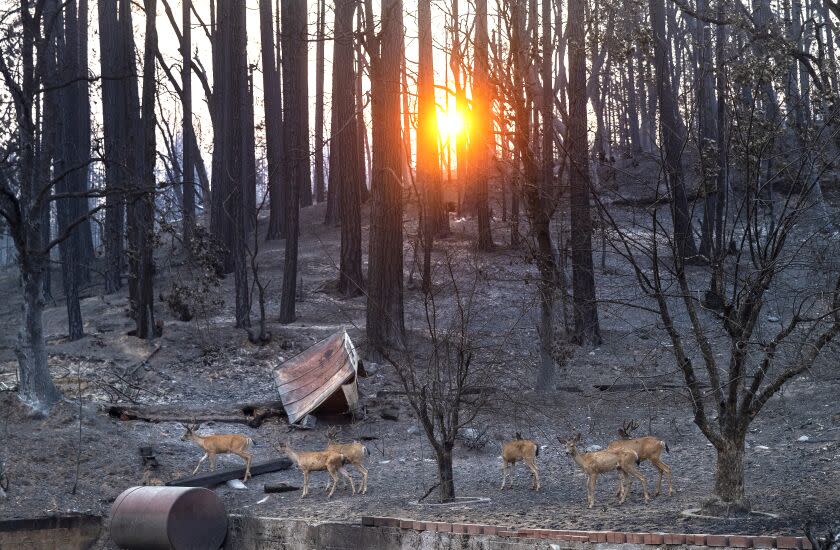Opinion: Climate change puts these readers' rural towns at risk. Why they want to rebuild

On climate change, California is at a crossroads. While the state is at the forefront of efforts to reduce greenhouse gas emissions and the effects of climate change, it must also decide where the flood or fire danger is too great, and which settlements are too risky to rebuild after they are destroyed.
The recent series by Times columnist Erika A. Smith and Anita Chabria focusing on Greenville, a community of 800 residents in the far northern Sierra Nevada that was devastated by the 2021 Dixie Fire, wrestled with these complex issues and came to a conclusion best summed up by the final installment's closing sentence: "We can no longer afford to remake the past, even if we loved it."
Plenty of people from those rural communities indeed "loved it," and they wrote to us to express their misgivings with the series and to make the case for rebuilding places like Greenville. If anything, their responses highlight the enormously complicated issues California faces, and the real people and communities upended, as it hardens itself against climate change.
————
To the editor: People in our Greenville community are understandably upset by your series on our town of 800 people, whose downtown and some outlying areas burned in the Dixie Fire. We have suffered the burning of our aging infrastructure and business district as well as most of our rental and retiree housing.
Our town is at the top of a watershed, so if you are in a Southern California community that has received water from Lake Oroville, that's our water you're using. We are a community comprising Indigenous Californians (Mountain Maidu) who have lived here since forever, and the descendants of white settlers who've been here since the late 1800s. These are homeowners and property owners in a working-class and middle-income town.
Where do you suggest we move? If our properties here are worth less than $400,000, where is this magical place we can afford?
The writers' biggest failure is their lack of appreciation for the meaning of community. As a Southern Californian who moved to the Sierras 20 years ago to raise my kids close to my mothers, I have experienced a community that goes beyond political and ideological divides. We care for and support one another, whether we like one another or not.
Climate change is here, and its effects are statewide. When we lived in Mission Viejo, I witnessed fires from our bedroom balcony. Are people in those communities supposed to move as well? As long as Southern California relies on water, agriculture and timber from Northern California, we are interconnected, and solutions should deal with all of our geographies with equity and fairness.
Margaret Garcia, Greenville, Calif.
..
To the editor: Smith and Chabria question whether rebuilding after fires in Northern California should be paid for by Southern Californians, who depend on water from the rural north.
But I guess it's OK to rebuild after fires in Southern California, which yes, just like in the Sierras, burn repeatedly in the same places. Oh, and maybe none of the Southern California residents who live on earthquake faults should be "subsidized" either.
Yes, let's talk about hypocrisy.
Denise Downie, South Lake Tahoe, Calif.
..
To the editor: As a resident of a rural community in Fresno County that almost suffered the fate of Greenville during the 2020 Creek Fire, I have some ideas for your columnists — and Sacramento politicians — when it comes to rural communities.
How about talking to us instead of lecturing us? Another thing would be to listen to rural residents and consider their grievances with Sacramento and urban California.
And it should also be pointed out that policies that "sell" in urban areas often do not in more rural communities, whether it's water rights, wildfire prevention, gun rights issues, electric vehicle mandates or whatever.
Listening to rural residents' concerns, instead of ignoring them or treating them with contempt, would be a start in dealing with the urban-rural divide in this state.
Matt Wiser, Auberry, Calif.
..
To the editor: The series failed to recognize the value of rural California to the state as a whole.
Home to more than 80% of U.S. Forest Service land in California, rural communities are the supporting backbone for recreational tourist destinations, preservation of vital watersheds and operation of essential water and electrical infrastructure. These industries benefit all Californians and require an established local workforce to maintain these valuable services.
When coupled with substantive forest health projects, rural communities rebuilt following wildfire are also not doomed to reburn. The power of forest treatment projects in preventing catastrophic wildfire damage to communities has been proven as recently as the Christmas Valley example with the Caldor fire.
And many communities throughout California, rural and urban, are unfortunately high-risk. Indeed, there would be very few places left to live if we were simply to abandon any community where the potential for flooding, earthquake or fire disasters were present.
Rebuilds are a one-time solution to a long-term wildfire problem, brought on by climate change and decades of forest mismanagement, requiring continuous state and federal investment in a sustainable forest environment. Such investments preserve and protect the environment and the supporting workforce in rural California to the benefit of the entire state.
Kevin Goss, Quincy, Calif.
The writer is a member of the Plumas County Board of Supervisors.
This story originally appeared in Los Angeles Times.

